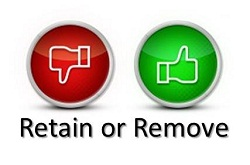 “Look around your home. How much ‘stuff’ do you have? You can simplify your life, and reduce the effort it takes to maintain your home, just by taking stock of what you have from time to time. This becomes even more important if you are considering selling your home in the near future. Having less ‘stuff’ in your home will allow it to show better and make it easier for you to pack when you are ready to move. The following article provides some basic points on how to get started and what to do on a regular basis to help manage the clutter.”
“Look around your home. How much ‘stuff’ do you have? You can simplify your life, and reduce the effort it takes to maintain your home, just by taking stock of what you have from time to time. This becomes even more important if you are considering selling your home in the near future. Having less ‘stuff’ in your home will allow it to show better and make it easier for you to pack when you are ready to move. The following article provides some basic points on how to get started and what to do on a regular basis to help manage the clutter.”
DC Metro Realty Team – Denise Buck & Ed Johnson
The more things you have, the more you have to take care of. And in this case, the more that you have to store that gets in the way of finding the things that you actually use. Periodically, you need to go through every closet, drawer, cabinet and storage area to get rid of the things that are just taking up space in your home and your life.
Every item requires the decision to retain or remove. Consider these questions as you examine each item:
• When was the last time you used it?
• Do you believe you’ll use it again?
• Is there a sentimental reason to keep it?
You have four options for the things that you’re not going to keep.
1) If you know someone who needs it or will appreciate it, you can give it to them.
2) You can sell it in a garage sale or on Craig’s List
3) You can donate it to a charity and receive a tax deduction
4) You can discard it to the trash.
Start with your closet. If you haven’t worn something in five years, get rid of it. Then, go through the things again and if you haven’t worn it in two years, ask yourself the real probability that you’ll wear it again.
Another way to do it is to move it from your active closet to another closet. If a year goes by in the other closet, the next time you go through this exercise, those clothes are on their way out.
You can follow the same process in linen closets, cabinets and the garage.
If the items taking up space are financial records and receipts, the solution may be to scan them and store them in the cloud. There are plenty of sites that will offer you several gigabytes of free space and it may cost as little as $10 a month for 100 GB at Dropbox to get the additional space you need. It will certainly be cheaper than the mini-storage building.

